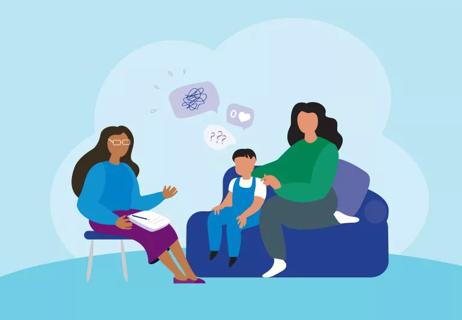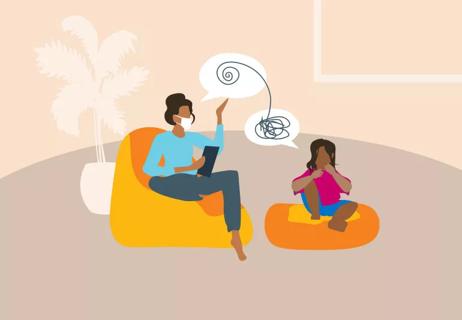Appetite changes, social isolation, repetitive behaviors and more may indicate that your child is struggling

All kids have emotional ups and downs. It’s a normal and healthy part of growing up. But we also have to contend with some pretty scary statistics about children’s mental health. According to the National Institutes of Health (NIH), nearly 20% of U.S. kids between the ages of 3 and 17 have a mental, emotional, developmental or behavioral disorder.
Advertisement
Cleveland Clinic is a non-profit academic medical center. Advertising on our site helps support our mission. We do not endorse non-Cleveland Clinic products or services. Policy
There’s nothing wrong with a few bumps in the road. But how can you tell if your child is struggling with something more serious? And when should you seek professional help? Psychologist Kristen Eastman, PsyD, shares 10 indicators that it’s time for your child to see a therapist.
“Some moodiness, anxiety, social and school difficulties are to be expected as children develop,” says Dr. Eastman. These setbacks are usually temporary. And overcoming them can help build resilience.
“They present opportunities for your child to build new skills to add to their toolbox,” she notes. “In most cases, if you offer support, validation and patience, your child can usually figure it out.”
So, how do you know if they’re dealing with something more intense than a speed bump on the road to adulthood?
First things first: Dr. Eastman recommends that parents trust their gut.
“You know your child best,” she reinforces. “If something just doesn’t feel right, trust that instinct. It’s better to go and get something checked out if you’re not sure.”
Dr. Eastman recommends considering therapy if your child:
Advertisement
It’s natural for parents to want to jump in quickly and try to problem-solve for their kids. Especially if they’re displaying worrying behavior.
But first, Dr. Eastman says that your child just needs to know they’re being heard and understood. She suggests using validating phrases like, “I see this is really hard for you,” or “I notice you’ve been struggling lately.”
Dr. Eastman adds that validation is key.
“You’ll be surprised how far validating your child’s experience can go in helping them feel supported,” she emphasizes. “That will make them more receptive to talking about how to get through their challenges. Often, if you just say to your child, ‘Does this feel like something we need to get some help with?’ they’ll say, ‘Yeah, it does.’”
Parents are often surprised by how willing their children are to get extra help. That help is as close as your pediatrician. Virtual mental health support may be an option, too, depending on where you live.
Don’t be afraid to broach the topic of therapy with your child’s doctor, Dr. Eastman urges.
“Pediatricians are often very good at helping parents differentiate what is and isn’t normal and can offer reassurance,” she reassures. If necessary, your pediatrician can refer you to a counselor who is a good match for your child and recommend other resources.
Parents sometimes assume that mental health treatment will mean medication or hospitalization. Those services do exist for kids who need them — and that’s a good thing! But getting mental health care for your child doesn’t have to look that way. It can be as low-key as learning about time management and learning new skills to make things easier.
“Their issues don’t have to be severe for therapy to be worthwhile,” Dr. Eastman clarifies. “Getting some extra support can help your child — and even you as a parent — learn new coping skills and strategies for handling problems,” she adds. “We need to de-stigmatize the idea of mental health treatment.”
If your child is thinking or talking about suicide, respond in a calm, supportive way. After all, they’re doing exactly what they’ve been taught to do in a crisis: They’re trusting you.
If you’re comfortable that your child isn’t in immediate danger, call their provider as soon as possible. If your kid’s in imminent danger of harming themselves or someone else, call emergency services or take them to the emergency room.
If you’re not sure what to think, or need somebody to talk to, consider calling a 24/7 hotline.
Advertisement
Whether your child needs help navigating normal developmental challenges or is dealing with something more serious, seeking help can make life easier and happier for them and you.
Advertisement
Learn more about our editorial process.
Advertisement

A glass child is the sibling of someone with special needs — often seen as the easy one, but carrying invisible burdens

Golden children often deal with perfectionism, low self-esteem and strained relationships as adults

Think of this behavior as a role reversal between parent and child — when a child takes on responsibility that’s not developmentally appropriate for their age

Tantrums and meltdowns are normal, but you can help your child manage their bigger emotions

American teens are facing unprecedented rates of depression and suicide, but you can be there to support and help them

Unexplained injuries, mood changes and sudden isolation may be signs your child needs help

Be involved in your kid’s care, but be mindful of boundaries

Look for comfort, fit and a feeling of partnership

The tropical fruit is a good source of antioxidants and vitamin C

Most people fall asleep within 10 to 20 minutes, but if your experience is different, adjusting your sleep schedule may help

Exploring your hidden side can lead to better understanding of what makes you tick